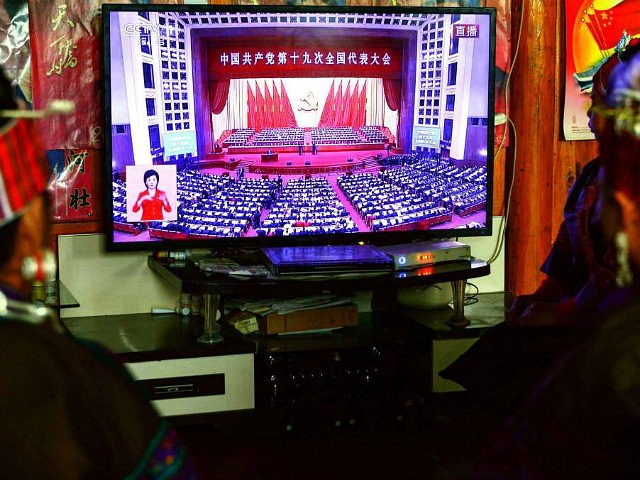China’s Global Times was pleased to announce on Wednesday that cell phones and TV sets have become eyes and ears for the largest mass surveillance network in the world, monitoring citizens in even rural communities and feeding the results into artificially intelligent computer systems.
The surveillance system is called “Sharp Eyes,” and its ostensible purpose is to help villages fight crime with limited police manpower. Leaving aside the question of whether the immense security apparatus in China can fairly be described as understaffed, the system is described as chillingly effective:
A fight was brewing in the streets of Jiantai village, Shifang, Southwest China’s Sichuan Province, the result of financial disputes between villagers. Just as a young man was about to pull a knife, the police promptly arrived, stopping what could have become a blood bath.
The suspects did not know that their street fight was being watched at home and on phones by their fellow villagers, whose television sets and mobiles were connected to surveillance cameras placed around the rural neighborhood through streaming boxes and apps. A villager who had witnessed the entire incident on his TV reported it to the police simply by pressing a button on his remote control.
This case, covered by Xinhua in late 2016, is an example of the capability of China’s new mass surveillance network in rural areas, which could eventually turn every television set and mobile phone in the countryside into a security monitoring terminal.
Xueliang, or Sharp Eyes, derived its name from the popular Chinese saying “The masses have sharp eyes,” which depicts the power of the people. Headed by the Central Political and Legal Affairs Commission of the Communist Party of China (CPC), the project is an extension of China’s Skynet surveillance network into rural areas, using artificial intelligence (AI), facial recognition and big data.
“Every household can become a monitor terminal, and every villager can be a monitor. This is in line with the CPC’s ‘mass line’ tradition, mobilizing people’s enthusiasm to boost rural security,” Wang Qiang, a specialist in non-war military actions at the National Defense University of the People’s Liberation Army, told the Global Times.
Villagers can actually watch footage from dozens of security cameras on their home television sets and smartphones. The “Sharp Eyes” system now covers 14,087 villages with 41,695 surveillance cameras and is intended to cover every foot of China by the time it is complete, according to the Global Times. The cost of the system is expected to reach over 100 billion yuan, or a little north of $15 billion U.S. dollars.
Keeping in mind that Chinese government statistics are always dubious, proponents of the Sharp Eyes system claim it has been a tremendous deterrent to crime, reducing the crime rate by up to 50 percent in some areas.
The Global Times breezily dismisses privacy concerns by noting that all of the surveillance cameras are supposedly “installed in public places” accompanied by “obvious notices reminding people of entering surveillance areas.” It also argues that the density of cameras to citizens is higher in countries like the United Kingdom and the United States.
Not content with a network of stationary cameras in clearly marked public areas, the Chinese government is also spying on its citizens with robot birds.
Over 30 Chinese government agencies have deployed tiny drones that look just like birds in flight, at least from the average viewing distance, over trouble spots including the restless Muslim Uighur province of Xinjiang. The drones fly by flapping their wings precisely as a real bird does, using “biologically inspired engineering” to evade human detection.
A source inside China’s “Dove” project told the South China Morning Post that the robots “replicate about 90 percent of the movements of a real dove” and make very little noise why they fly, making them so lifelike that “actual birds often fly alongside them.” Their size and realistic motions also make them hard to spot with radar.

COMMENTS
Please let us know if you're having issues with commenting.